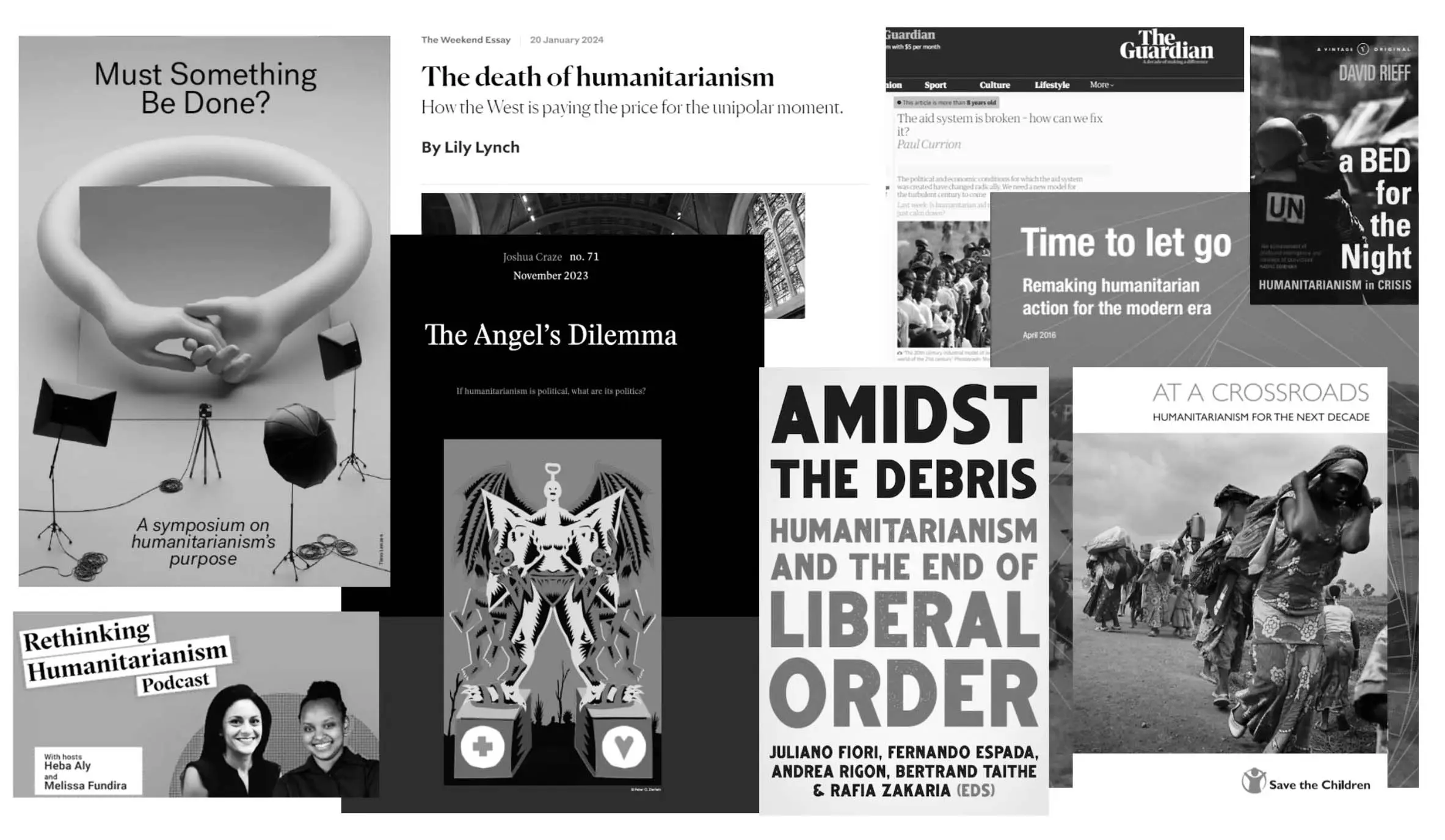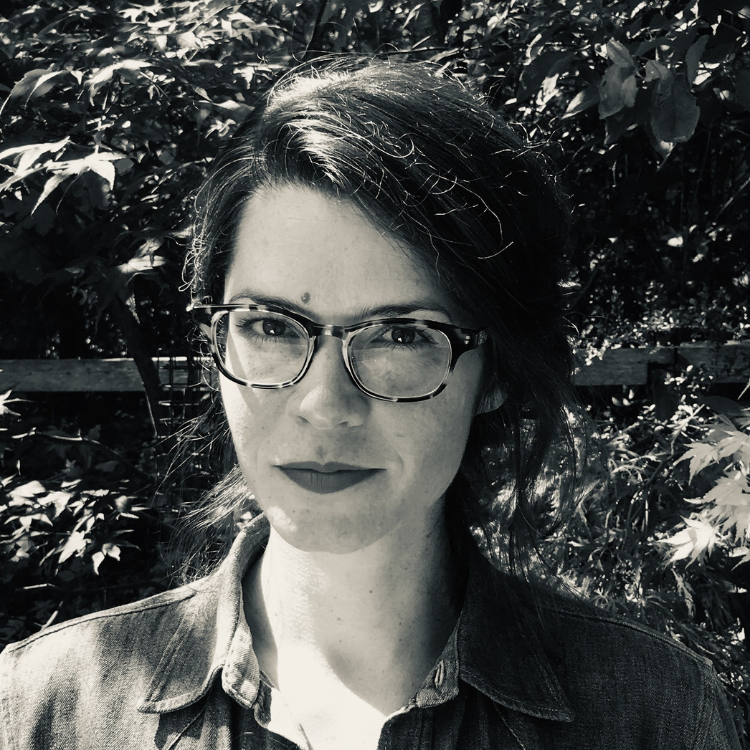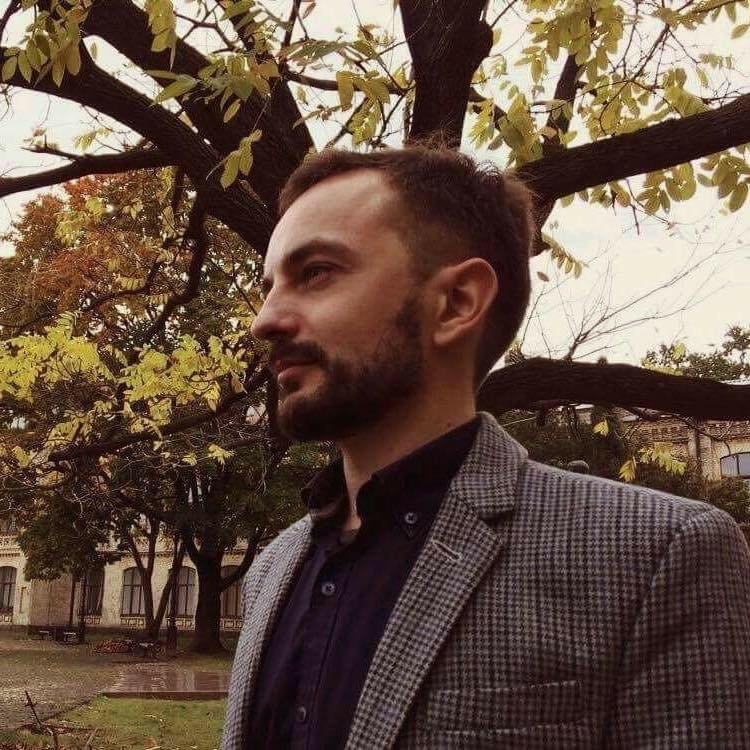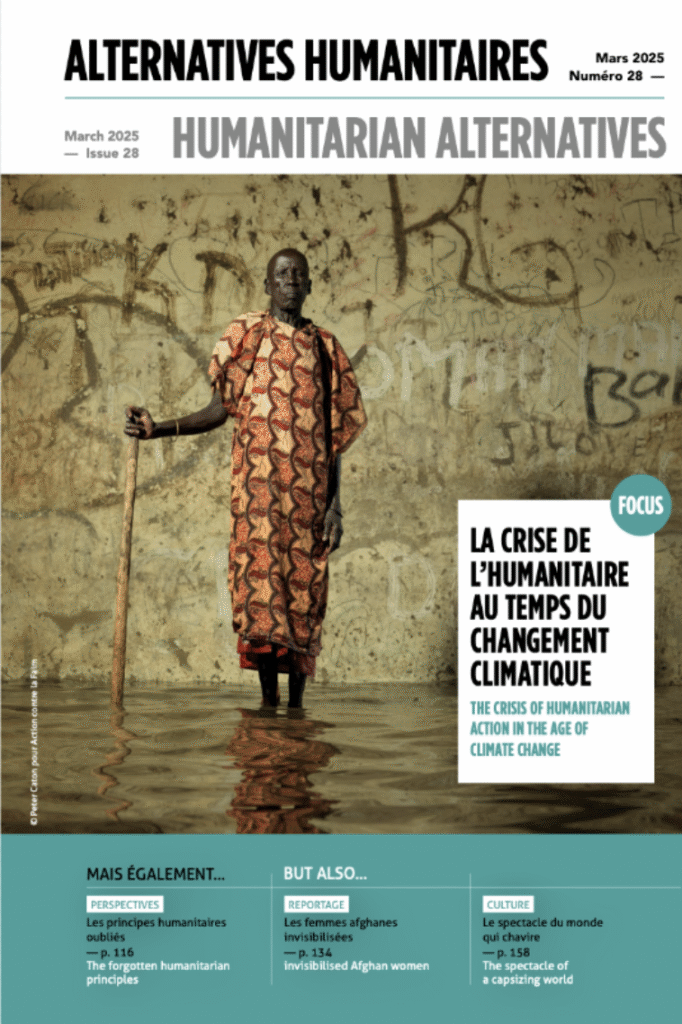PROJETO DE PESQUISA
Os limites do humanitarismo
Política, crise e reforma na era da mudança climática
Eleanor Davey e Fernando Espada

O projeto de pesquisa " Os limites do humanitarismo: Política, crise e reforma na era da mudança climáticas", liderado por Eleanor Davey e Fernando Espada, examina o encontro do sistema humanitário com as mudanças climáticas. Combinando abordagens históricas e de economia política, o projeto parte de perspectivas morais, técnicas e baseadas no mercado para explorar as complexidades da reforma no sistema humanitário. Estruturado em torno de dois temas, "contenção da política" e "governança da crise", a pesquisa incorpora workshops, apresentações e atividades on-line, com o objetivo de publicar uma série de textos para diferentes públicos. O projeto será executado entre novembro de 2023 a maio de 2025, e pretende se envolver criticamente com abordagens alternativas que os agentes humanitários poderiam considerar diante das mudanças climáticas.
ABORDAGEM DA PESQUISA
O projeto adota uma abordagem diferenciada para a reforma do setor humanitário, com o objetivo de desnaturalizar e criticar algumas de suas dinâmicas subjacentes. A pesquisa busca fornecer uma agenda compartilhada para aqueles que estão dentro e fora do sistema humanitário, abordando críticas fundamentais em meio às incertezas impostas pelas mudanças climáticas. O foco nos temas "contenção da política" e "governança da crise" esclarece os limites que o sistema humanitário está encontrando ao definir sua abordagem à crise climática e suas implicações mais amplas.
Contenção da política
- Dinâmica política e mudanças históricas: Explora a política nos processos de diagnóstico que moldam a reforma humanitária, desde a década de 1970 até o presente, considerando a instabilidade ecológica e as mudanças no engajamento internacionalista.
- Pautas na Reforma Investiga a definição da agenda durante a reforma, concentrando-se em como isso molda os compromissos humanitários e o papel das diferentes atitudes em relação à política.
- Impacto do mundo natural na resposta às mudanças climáticas: Examina o lugar do mundo natural nas abordagens humanitárias, avaliando sua influência nas respostas às mudanças climáticas.
- Funções e limites políticos: Explora como os atores que cruzam as fronteiras políticas afetam as atitudes políticas dentro do sistema humanitário, estudando os casos de maior envolvimento político e as reações que eles provocam.
- Rastreamento de padrões para caminhos alternativos: Analisa os padrões de contenção da política, com base em diversas experiências para entender a dinâmica de poder dos atores dominantes, oferecendo percepções para caminhos alternativos atualmente.
Governança da crise
- Ordem Liberal: Analisa como a ordem liberal enquadra as definições de crise, influenciando a compreensão, a legitimidade e as estratégias de resposta das organizações humanitárias, no contexto do impacto da mudança climática sobre a ordem liberal internacional.
- Natureza Social e Política da Crise: Examina a natureza social e politicamente construída da crise, evitando abordagens tecnocráticas e seu esgotamento semântico, transformando as crises em estados permanentes que exigem gerenciamento.
- O Papel do Mundo na Resposta a Crises: Reconhece o papel central do mundo natural nos sistemas de vida humana durante as crises, explorando como sua interdependência é integrada ou marginalizada na defesa da vida por vários atores dentro e fora do sistema humanitário formal.
- Perspectivas futuras sobre a crise: Interroga o significado e a aplicação da crise em meio à intensificação da mudança climática, afastando-se da ordem liberal em direção a entendimentos e abordagens alternativos.
- Design de pesquisa e implicações práticas: Situa os enquadramentos retóricos da crise humanitária em debates teóricos e políticos mais amplos, conectando a análise às práticas de resposta e gerenciamento de crises.
Contexto Operacional:
O conflito na Ukrania
pesquisadoras

ELEANOR DAVEY
Eleanor Davey escreve sobre histórias de ajuda e ativismo e como as perspectivas históricas podem informar os entendimentos atuais. Seu livro Idealism beyond Borders (Idealismo além das fronteiras) examinou como as ideias sobre a responsabilidade pelo sofrimento dos outros moldaram os compromissos políticos e humanitários na França, incluindo a criação da Médicos Sem Fronteiras. Ela publicou sobre dinâmicas de poder e debates dentro e entre organizações humanitárias e seus interlocutores, incluindo histórias do direito humanitário internacional e outros conceitos de intervenção, engajamentos humanitários com grupos armados anticoloniais e ajuda em situações de deslocamento e confinamento. Além de sua própria pesquisa, ela apoiou uma ampla gama de projetos de pesquisa acadêmicos e voltados para a prática, por meio de várias funções no Overseas Development Institute (Londres), no Humanitarian and Conflict Response Institute (Universidade de Manchester) e no Humanitarian Advisory Group (Melbourne).

FERNANDO ESPADA
Fernando Espada é Diretor de Assuntos Humanitários da Save the Children. Ele ingressou na Save the Children em 2014, depois de ter trabalhado como Pesquisador Sênior e Associado de Políticas na DARA, Gerente de Pesquisa de Campo do Humanitarian Response Index e Diretor Adjunto do think tank FRIDE, entre outros. Fernando é membro do conselho editorial do Journal of Humanitarian Affairs, coeditor de Amidst the Debris: Humanitarianism and the End of Liberal Order (Em meio aos destroços: o humanitarismo e o fim da ordem liberal), editor de artigos sobre humanitarismo e ensaios sobre política humanitária. Ele já conduziu pesquisas de campo e análises de políticas em diversos de respostas humanitárias.

Nina Potarska
Nina Potarska é especialista em gênero na construção da paz e resolução de conflitos. Tem experiência em gestão de ONGs e projetos de pesquisa, bem como em pesquisa e análise. Desde 2016, ela é a coordenadora nacional da Liga Internacional das Mulheres pela Paz e Liberdade na Ucrânia. Os objetivos do programa são aumentar a participação das mulheres e garantir que os aspectos de gênero sejam levados em consideração nas estruturas nacionais e internacionais. O foco principal é a identificação de violações de direitos humanos com base na análise de gênero. Como parte de suas atividades, ela monitora as necessidades e a observância dos direitos das mulheres que vivem perto da linha de contato, a violência baseada em gênero e a violência relacionada a conflitos, a mediação de conflitos com inclusão de gênero e prepara relatórios sobre a observância dos direitos das mulheres no sistema da ONU. Desde 2013, ela é diretora do Center for Social and Labor Research e, desde 2015, pesquisa tópicos relacionados à guerra na Ucrânia. Ela coleta narrativas e realiza pesquisas em ambos os lados da linha de contato.

Andrii Bahinskyi
Andrii Bahinskyi é professor associado do Departamento de Sociologia da Igor Sikorsky KPI (Kiev, Ucrânia) e coordenador do programa de mestrado "Resolução e Mediação de Conflitos". Como parte do projeto apoiado pelas embaixadas da Grã-Bretanha e da Suíça na Ucrânia, ele é um dos criadores do primeiro programa de mestrado na Ucrânia, que treina especialistas no campo da resolução de conflitos sociopolíticos. O Dr. Bahinskyi explora a construção da paz liberal construção da paz liberal a partir de uma perspectiva global. Sua pesquisa se concentra em encontrar soluções estratégicas para resolver conflitos armados. Sua análise também se dedica a questões de interação entre a sociedade civil e o Estado durante a guerra. Sua pesquisa dedica atenção especial às organizações da sociedade civil organizações da sociedade civil que apóiam grupos sociais vulneráveis na Ucrânia. Seus projetos de pesquisa mais recentes e publicações consideram as consequências humanitárias, sociais e políticas da guerra entre a Rússia e a Ucrânia.
RECENTES
DOSSIÊ
Este dossiê reúne um grupo diversificado e incisivo de pensadores para questionar o paradoxo duradouro do sistema humanitário: sua pretensão de neutralidade versus sua realidade profundamente política. Emoldurada pela introdução de Eleanor Davey, a coletânea revisita os principais momentos de reforma das décadas de 1970 a 1990, mostrando como as escolhas políticas são frequentemente disfarçadas como ajustes técnicos que isolam as estruturas de poder dominantes. Colaboradores como Mark Duffield, Rahmane Idrissa e Mandisa Mbali expõem como o humanitarismo deixou de salvar vidas para regular a morte, movimentos de base incompreendidos e violência racializada mascarada. Čarna Brković e colaboradores revelam como as intervenções não alinhadas da Iugoslávia desafiaram a ortodoxia humanitária ocidental, enquanto Pamela McElwee e Jan Eliasson questionam a evolução das estruturas ambientais e normativas.
WEBINAR
- 24 de abril de 2025
- 16h (GMT)
- Online
Quando o projeto chegou ao fim, organizamos um webinar em 24 de abril de 2025 para refletir sobre como o setor está navegando em um momento de profunda incerteza. Os palestrantes Andrii Bahinskyi, Eleanor Davey, Fernando Espada e Nina Potarska compartilharam percepções do projeto, que reuniu um grupo diversificado de autores e colaboradores. A conversa se baseou nos temas explorados nos ensaios e relatórios do projeto, que permanecem disponíveis no site do projeto.
ЗВІТ
Війна в Україні спричинила глибоку гуманітарну та екологічну кризу, оголивши глибокий взаємозв'язок між збройним конфліктом, руйнуванням довкіллля та глобальною продовольчою безпекою. У своєму останньому звіті Андрій Багінський та Ніна Потарська аналізують, як спричинені війною викиди CO₂, руйнування екосистем та порушення критично важливого сільськогосподарського виробництва створили нові фактори вразливості, що впливають на мільйони людей в Україні та за її межами. Дослідження також критикує жорсткі структури міжнародної гуманітарної допомоги, яка часто надходить із готовими рішеннями, що не можуть бути адаптовані до реалій на місцях.
Relatório
Ucrânia: guerra, mudança climática e as limitações do sistema humanitário
A guerra na Ucrânia desencadeou uma profunda crise humanitária e ambiental, expondo as profundas interconexões entre conflitos armados, destruição ecológica e insegurança alimentar global. Em seu último relatório, Andrii Bahinskyi e Nina Potarska analisam como as emissões de CO₂ induzidas pela guerra, a devastação do ecossistema e a interrupção da produção agrícola crítica criaram novas vulnerabilidades, afetando milhões de pessoas dentro e fora das fronteiras da Ucrânia. O estudo também critica as estruturas rígidas da ajuda humanitária internacional, que muitas vezes chegam com soluções pré-embaladas que não se adaptam às realidades locais.
Relatório
Uma reflexão crítica sobre a reforma humanitária - passado, presente e futuro
O relatório liderado por Eleanor Davey captura percepções vitais de um workshop que reuniu reformadores humanitários, acadêmicos e líderes do setor para dissecar o cenário em evolução da reforma. Com um olhar voltado para a complexa interação entre as mudanças climáticas, a geopolítica e as limitações estruturais, ele oferece um exame diferenciado das barreiras que persistem nas práticas humanitárias. O relatório traça as raízes dos esforços de reforma atuais, questionando se as estruturas entrincheiradas podem se adaptar a um mundo de crises crescentes e identificando áreas em que as restrições sistêmicas e a inércia organizacional muitas vezes impedem mudanças significativas.
OFICINA
Ucrânia: guerra, mudança climática e limitações do sistema humanitário
- 4 de julho
- 13h (GMT)
- Kiev e on-line
O workshop foi conduzido por Nina Potarska e Andrii Bahinskyi e teve como objetivo analisar a guerra russo-ucraniana no contexto da mudança climática e as limitações do sistema humanitário para responder à ação militar. O evento reuniu representantes da sociedade civil ucraniana, organizações internacionais que operam na Ucrânia, especialistas ambientais e sociais e representantes da comunidade acadêmica.
WORKSHOP - PARTE II
REFORMA HUMANITÁRIA
- 3 de julho
- 17:30h (GMT)
- Evento Online
Essa foi a segunda parte da reflexão crítica sobre a reforma humanitária. A primeira sessão (“a vontade”) explorou as reivindicações relacionadas à disposição de realizar as reformas exigidas, concentrando-se na influência da geopolítica e dos interesses adquiridos. A segunda sessão (“o caminho”) analisou as reivindicações relacionadas aos caminhos a seguir, observando primeiro a largura de banda disponível para a reforma e depois a capacidade atual de imaginar alternativas à medida que o sistema enfrenta a crise climática.
ESSAIO
Quando o mundo da emergência encontrou a crise climática é a mais recente publicação de Eleanor Davey e Fernando Espada. O ensaio discute a ineficácia e as desigualdades na resposta global às crises, com foco na pandemia da COVID-19, na invasão russa da Ucrânia e no conflito de Gaza. Os autores analisam o colonialismo inerente ao sistema humanitário, o fracasso em aprovar reformas substanciais e como essa transformação está ocorrendo em relação à crise climática.
* As opiniões expressas no artigo são de responsabilidade dos autores e não refletem necessariamente a posição da Save the Children ou de qualquer outra organização.
WORKSHOP - PARTE I
REFORMA HUMANITÁRIA
- 19 de Junho
- 17:30h (GMT)
- Evento Online
O workshop liderado por Eleanor Davey e Fernando Espada visa criar um espaço para a reflexão crítica sobre a reforma humanitária atual, reunindo pessoas atualmente envolvidas em iniciativas de reforma, líderes de esforços de reforma anteriores e acadêmicos de humanitarismo e assuntos internacionais. Os objetivos das discussões são: i. contribuir para a memória setorial e o aprendizado sobre a reforma humanitária; ii. informar abordagens para as estratégias e/ou iniciativas atuais de reforma; e iii. identificar possíveis caminhos para a pesquisa sobre o passado e o presente da reforma humanitária.
PALESTRAS DE AMIGOS
- 8 de Fevereiro de 2024
- 10:30h (Horário Britânico)
- Evento Online
Eleanor Davey e Fernando Espada apresentam o projeto de pesquisa financiado pela Alameda sobre as práticas, os limites, a história e as perspectivas de reforma do sistema humanitário na era das mudanças climáticas. Durante a sessão, os co-líderes do projeto refletem sobre os principais temas do projeto (contendo política e ordenando a crise) e a relevância dessa pesquisa para repensar as respostas coletivas aos desafios de nosso tempo.

